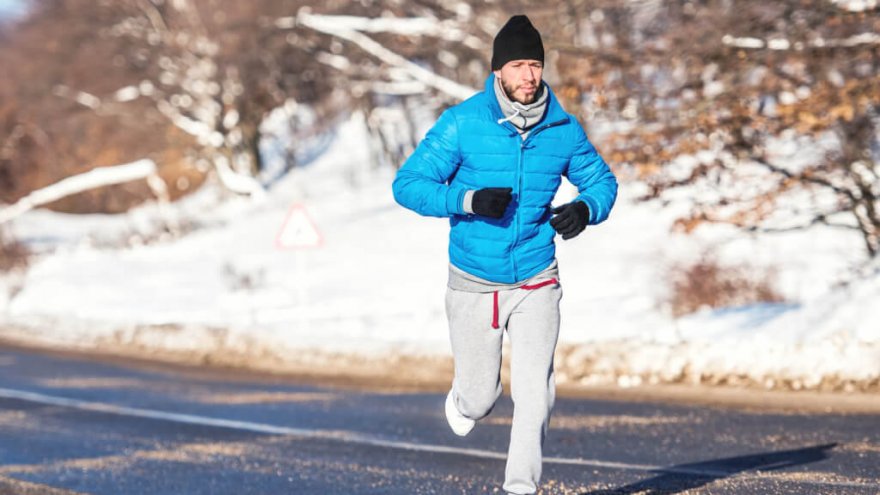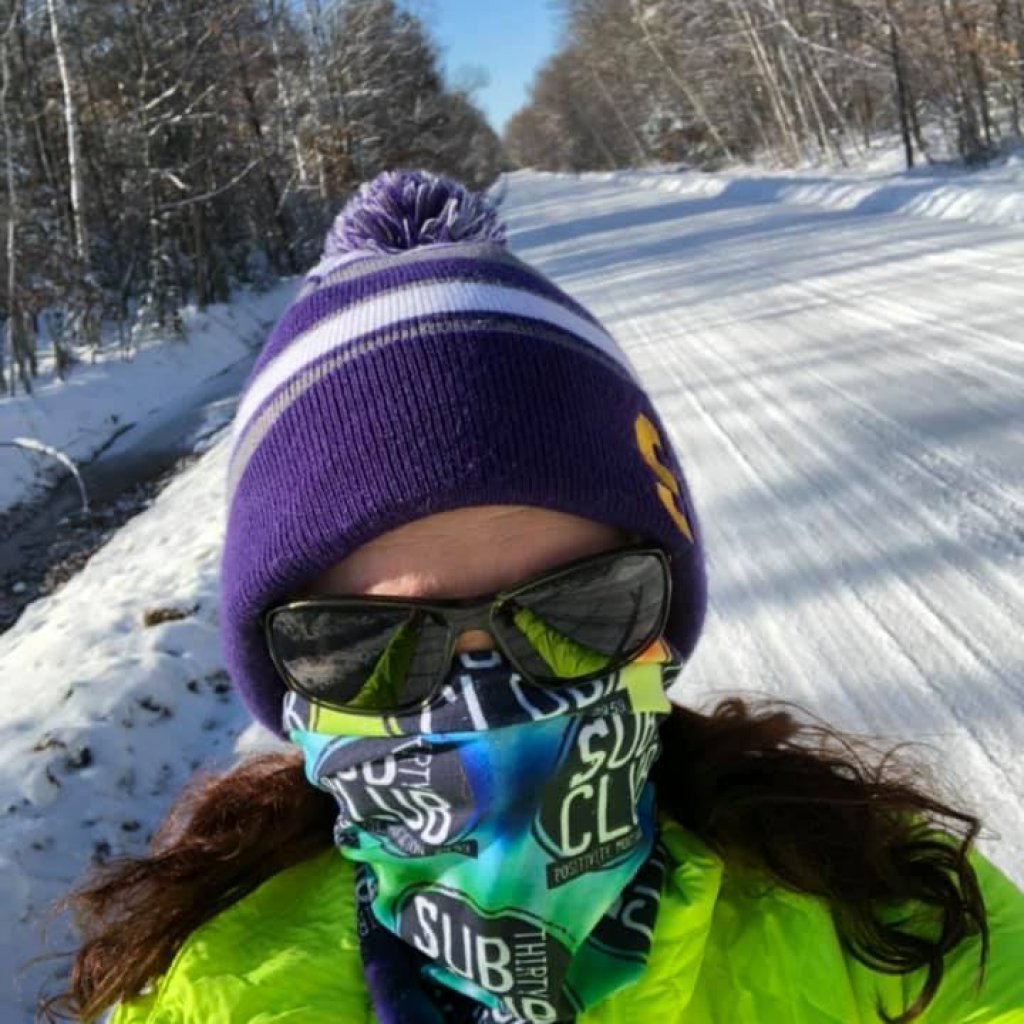Why Breathing Cold Air Hurts While Running

As summer turns to fall and the winter months loom ahead, runners are starting to unpack the cold weather running gear. If you have ever run in truly frigid temperatures, you understand how complicated a transition like this can be.
Why Does it Hurt to Breathe in Cold Air?
So, first, let’s tackle the question of why it hurts when you breathe in the cold air while running. Your body is an amazing thing, and it has figured out how to warm air to your body’s temperature. The secret is to do this without damaging the tissue. How can that happen?
Your body starts that warming process from the first inhale of cold air. It starts warming in your mouth and nose to warm by the time it reaches deep into your lungs.
Cold air is super dry, and the burning you feel when you breathe in the cold air is a combination of things. There is a heat and water exchange that happens when you breathe in the cold, dry air.
That sharp intake of cold air can actually leave you feeling breathless. Believe it or not, after you acclimate to the cold air, you actually kind of get used to it. This is why you often see runners with their mouths covered early in a race or run. Later on in the run, they often remove the face cover.

It was -17 on this frigid day. As you can see, I have almost no skin exposed on this cold winter run through my rural community. Honestly, I was more concerned with the slick, snow-covered road than the air temp.
Everything from keeping your hands and feet warm to figuring out how to breathe in the cold air can be a challenge.
Is Cold Air Bad for Your Lungs?
People new to winter running often express concern. A woman I was coaching called me in a panic. “I feel a weird cold air sensation when I inhale. Is it dangerous?” The answer is not black and white. It is “maybe.”
If you have been running outside all along, your body slowly acclimates to the cold as it slowly gets colder. So if you live in an area where you experience all of the seasons, including the frigid northern winters I have here where I live in Northeastern Wisconsin, your body responds much better to sub-zero temps than people without the ability to ease into it.
Just like you add layers to your body to keep warm, you might need a layer over your face to filter that cold air coming in.
Can Breathing in Cold Air Make You Sick?
Breathing in cold air does not typically harm a healthy lung. However, if you have asthma or other health issues, cold air can trigger an attack of bronchospasm.
The simple answer is that breathing in cold air does not make you sick. However, there is a long answer. Your upper respiratory system has a lining of very moist membranes whose job is to filter out bad things.
When you breathe in cold air, that all dries out. Guess what results from that? You guessed it. You are more susceptible to getting sick.
What Does a Cold Feeling in Your Chest Mean?
Very cold temperatures can trigger a cold feeling in your chest. One way to alleviate this is to protect your body against the cold. You can also slowly get used to the cold weather by running outside all along and getting your body acclimated.
Some people have cold weather threshold temps. That means that they do not go outside to exercise if it is below a certain temperature.
How Cold is Too Cold for a Runner to Breathe?
Personally, my cold weather threshold is -20 Fahrenheit. Now, as I say that, I have friends who have run outside in as low as -40. Those people would say that there is no temperature too low; instead, there is a lack of preparation for the cold weather.
Having said that, if you are not typically an outdoor, cold-weather runner, you will struggle more than someone who lives in a cold climate. I don’t have any difficulty running in twenty below zero. My southern friends, on the other hand, would likely struggle.
In case I sound like I think I’m super tough for saying this, keep reading. I am an absolute baby in hot temps. I think anything over 70 is hot. Ask my southern friends if they think 70 is hot. The point is, temperature is relative.

6 Ways to Combat the Cold
You can do some things to avoid feeling crappy while you run on the cold winter days.
- Run Indoors: The obvious first answer is to run inside. You can do this either on a treadmill or on an indoor track.
- Warm Up Indoors: If you hate the treadmill, another option is to do your warm-up indoors then head outside for your actual workout. Getting your body properly prepared for the workout is a great way to help hold off injury.
- Stay Hydrated: Go back and peak at what we had to say about the membranes losing moisture in the cold weather. Staying hydrated is a way to combat the cold.
- Breathe Deep: It may sound counterintuitive, but breathing deep, long breaths helps. Avoid quick, shallow breaths.
- Lower Intensity: When it’s super cold, it is a good time to ease up on the intensity of your workout.
- Mouth Cover: If you are worried about breathing in the cold weather, purchase yourself some mouth cover. This can be anything from a buff to a scarf.
Run Safe and Smart!
If you are up to a frigid temperature run, you are probably safe to take your workout outside in very cold temps. If you hate the bitter cold, it is okay to hit up your local gym instead.
Just know that if you are adequately trained and have proper gear, you can keep yourself safe in pretty extreme temps. Be smart and safe.
Latest Articles
 Is Running on a Treadmill Easier Than Running Outside?Runners have their own preferences, whether it is treadmill running, running outside on the road, or exploring trails. So...
Is Running on a Treadmill Easier Than Running Outside?Runners have their own preferences, whether it is treadmill running, running outside on the road, or exploring trails. So... Is It OK to Use Trail Running Shoes on the Road?While trail running shoes can be used on roads, especially in situations where a runner encounters mixed terrains or pref...
Is It OK to Use Trail Running Shoes on the Road?While trail running shoes can be used on roads, especially in situations where a runner encounters mixed terrains or pref... How to Fix Sore Quads After Running?Rest, ice, gentle stretching, and over-the-counter pain relievers can help soothe sore quads after running. Also, ensure ...
How to Fix Sore Quads After Running?Rest, ice, gentle stretching, and over-the-counter pain relievers can help soothe sore quads after running. Also, ensure ... 10 Fruits With The Most Electrolytes to Replace Sports DrinksThese fruits are high in electrolytes such as potassium, magnesium, and calcium, essential for hydration, muscle function...
10 Fruits With The Most Electrolytes to Replace Sports DrinksThese fruits are high in electrolytes such as potassium, magnesium, and calcium, essential for hydration, muscle function...

